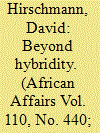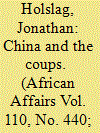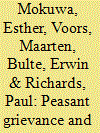|
|
|
Sort Order |
|
|
|
Items / Page
|
|
|
|
|
|
|
| Srl | Item |
| 1 |
ID:
106032


|
|
|
|
|
| Publication |
2011.
|
| Summary/Abstract |
This article investigates the cultural dynamics and tensions of efforts to reform African tax bureaucracies according to contemporary global standards of independence, transparency, and efficiency. Focusing on the controversial establishment of a semi-independent tax authority in Mauritius, the article perceives tax reform as an uneasy and unstable meeting of different organizational cultures and epistemic communities. Unlike much existing literature - which understands public sector reform within the dichotomy of the modern and the traditional, and a resulting hybridity of bureaucratic culture - the article suggests that the notion of 'tribidity' better describes the reformed Mauritian tax authority. Here, three bureaucratic cultures interact: a global semi-private sector, centred on the performance-based culture of New Public Administration (NPA); a communal culture, emphasizing loyalty, ethnic identity, and union solidarity; and a Weberian culture, where process, hierarchy, and security are fundamental. The unsettled interplay of these overlapping bureaucratic cultures determined the fate of Mauritius's tax reforms, showing how such reform cannot be approached as entirely technical and apolitical.
|
|
|
|
|
|
|
|
|
|
|
|
|
|
|
|
| 2 |
ID:
106030


|
|
|
|
|
| Publication |
2011.
|
| Summary/Abstract |
However destabilizing illegitimate regime changes are for Africa, they have not caused China to change its policies. Examining five coups that occurred in Africa between 2003 and 2010, this article argues that China did not see the coups as major threats to its interests, but accepted instability as a part of doing business in Africa. China remained sceptical of democracy as an antidote to instability and deeply distrusted the effort of Western countries to promote liberal political standards. China therefore continued to display conservative self-restraint, a preference for unilateralism, and a pragmatic mercantilist policy intended to strengthen its economic presence. If China is guided by any strategy, it is the strategy of adapting to political realities, rather than trying to shape them.
|
|
|
|
|
|
|
|
|
|
|
|
|
|
|
|
| 3 |
ID:
106031


|
|
|
|
|
| Publication |
2011.
|
| Summary/Abstract |
Though peace and a new inclusive form of politics were promised, Museveni's Uganda has been plagued by a series of civil wars. This article explains the continuation of and propensity towards conflict by focusing on the country's 'elite bargain', defined as the distribution of positions of state power between contending social groups. Analysing Uganda's elite bargain in terms of political, economic, military, and territorial power sharing, the article argues that it has been only partially inclusive. Political, military, and economic power have remained ethnically biased in favour of groups from western and central Uganda, and this in turn has been a major driver of recurrent civil wars. Increased territorial power sharing since the late 1990s helps explain the recent decline in violent conflict, and may also help prevent new civil wars.
|
|
|
|
|
|
|
|
|
|
|
|
|
|
|
|
| 4 |
ID:
106029


|
|
|
|
|
| Publication |
2011.
|
| Summary/Abstract |
Was the civil war in Sierra Leone (1991-2002) fought for diamonds, or was it a peasant insurgency motivated by agrarian grievances? The evidence on both sides is less than conclusive. This article scrutinizes the peasant insurgency argument via a more rigorous methodology. Hypotheses concerning intra-peasant tensions over marriage and farm labour are derived from an examination of the anthropological literature. These are tested using econometric tools, applied to data from a randomized survey of 2,239 households in 178 villages surrounding the Gola Forest in eastern and southern Sierra Leone, the cradle of the war. It is shown that a decade after the war ended peasant disputes over marriage continue to mark out an incipient class divide in isolated rural communities, as evidenced by cases presented in local courts and family moots. Disputes mainly involve a village elder suing a young man with weak social protection. Fines are exceptionally high, and mostly paid off in the form of coerced farm labour. It is argued that grievance over this long-standing form of labour exploitation fed insurgency, and contributed to the otherwise puzzlingly high levels of peasant-upon-peasant violence associated with the war in Sierra Leone.
|
|
|
|
|
|
|
|
|
|
|
|
|
|
|
|
| 5 |
ID:
106033


|
|
|
|
|
| Publication |
2011.
|
| Summary/Abstract |
The government in post-genocide Rwanda stakes its moral claim to legitimacy on a policy of national unity and reconciliation, claiming to create a 'Rwanda for all Rwandans'. This article investigates peasant resistance to this policy. Focusing on everyday acts of resistance among the rural poor, it demonstrates that despite the appearance of widespread popular support, many peasant Rwandans consider the various mechanisms of national unity and reconciliation to be unjust and illegitimate. Obedience to the dictates of the policy of national unity is frequently tactical, rather than sincere, as peasants employ various strategies to avoid participation. Through a focus on everyday acts of resistance, the article reveals how the post-genocide state through the policy of national unity and reconciliation seeks to depoliticize peasant people by orchestrating public performances and by closing off the possibility for individuals to join together to organize politically.
|
|
|
|
|
|
|
|
|
|
|
|
|
|
|
|
|
|
|
|
|